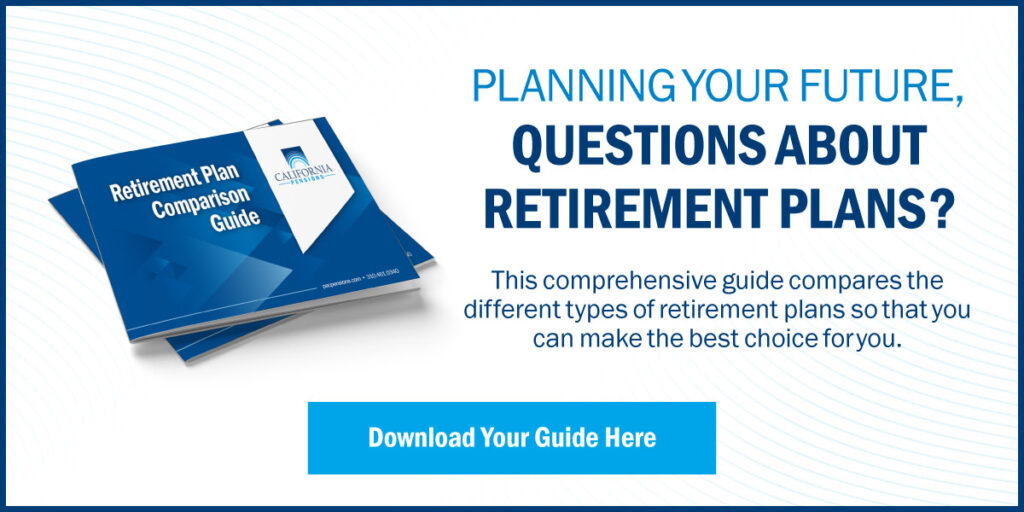Choosing the right retirement plan for your company or organization can be a daunting task. There are so many different types of plans and each plan functions differently. Local and federal regulations can also affect which plans are available to your company. To make the task of choosing a retirement plan easier we have put together an overview of the types of retirement plans that we offer at California Pensions with the pros and cons of each plan.
Stay Compliant with our Fiduciary and Plan Sponsor Checklist
401(k)
401(k) plans enable workers to save and invest a piece of their paycheck pre-tax. They are one of the most popular types of retirement plan available today. Depending on the type of plan, 401(k)s are also subject to different types of non-discrimination tests.
Pros:
- Most widely available and understood retirement plan option
Cons:
- The IRS requires yearly nondiscrimination testing
Profit Sharing
Profit-sharing is one plan option that employers of for-profit businesses can offer their employees. With profit-sharing, the contributions are usually based on the profitability of the company. This means that in better years, employers contribute more to the employee’s retirement plan. Unlike many other forms of retirement plans, profit-sharing plans do not allow the employee to contribute to the plan.
Pros:
- The plans are adjustable and can change based on the profit of the company
- Allows employees to feel like they have a stake in the company
Cons:
- The IRS requires yearly anti-discrimination testing
- Participant disclosures must be sent out each year to all employees who participate
403(b)
403(b) plans are like 401(k) as they are both qualified tax-advantaged retirement plans. However, 403(b) plans differ in that they are only available to certain government employees and non-profit organizations. 403(b) plans are not required to complete the same type of yearly testing that 401(k) plans are.
Pros:
- Lower administrative cost for the business
Cons:
- Only available to some government and non-profit organizations

One thing to consider when choosing a retirement plan for your business is the size of the company.
457(b)
A 457(b) retirement plan is a tax-advantaged and defined contribution retirement plan. A percentage of the employee’s salary is deducted from their paycheck each pay period for a 457(b) plan. Contributions for a traditional 457(b) plan are taken out before taxes, meaning that you will have to pay those taxes when you retire. 457(b) retirement plans are limited to state and local government employees and employees of certain IRC 501(c) nonprofit organizations.
Pros:
- Can be offered as a Roth 457(b) or as a traditional 457(b)
Cons:
- Limited to state and local government and certain IRC 501(c) nonprofit organizations
Defined Benefit
A defined benefit plan is one of the retirement options that is funded by an employer. It is called a defined benefit plan because the formula that is used to calculate retirement benefits is determined at the creation of the plan. Employers are required to maintain adequate balances in the plan, from either contributions or earnings, in order to attain the benefit results.
Pros:
- Benefits are predictable which makes planning retirement easier
- Contributions are decided by the employer and are tax deductible
Cons:
- Plans are costly for the employer
- Penalties may be incurred if regulations or funding requirements are not met
Cash Balance
Cash balance plans are a form of defined benefit retirement plans. Each year the participant’s employer credits the participant’s account with a set percentage of their yearly compensation plus interest. The eventual payout that the participant will receive when they retire is set when the cash balance plan is first opened.
Pros:
- Contributions are tax-deductible
- The contribution limits are substantially higher than a traditional 401(k) plan
Cons:
- Cost more to maintain and operate than a traditional 401(k) plan
- Employer contributions are mandatory so it may not be feasible for some companies to offer
Davis-Bacon
The Davis-Bacon and Related Acts apply to contractors working on federally funded or assisted contracts that exceed $2,000. Davis Bacon plans are IRS-approved plans designed specifically for contractors who work on Davis-Bacon Contracts. These plans can reduce payroll taxes and general liability insurance premiums, resulting in higher profits.
Pros:
- Taxes and liability insurance premiums can be reduced
Cons:
- Limited to contractors working on government projects
Non-ERISA
In non-ERISA plans, employees choose investments and manage deposits and withdrawals of funds. Employers are still involved in compliance activities related to the plan though. Only certain types of organizations are legally allowed to use non-ERISA retirement plans. Organizations and businesses that can use non-ERISA plans are churches, religious organizations, public schools, hospitals, and nonprofit organizations.
Pros:
- Less work for the employer by not having to choose investments, deposits, and withdrawals
Cons:
- Limited as to what sort of businesses and organizations may participate
Choosing a retirement plan option for your company or organization can be stressful, but California Pensions is here to help you understand and manage your retirement plan options. To learn more about our services and the plans we offer, visit our website today!


